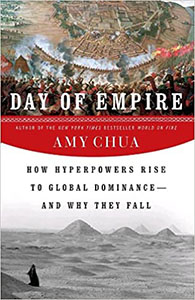
Day of Empire: How Hyperpowers Rise to Global Dominance and Why They Fail
LJ HowardBy Amy Chua (Doubleday)
Reviewed By LJ Howard, 1 March, 2021
Day of Empire: How Hyperpowers Rise to Global Dominance and Why They Fail is an extremely easy to read and easy to understand dissection of eleven geopolitical empires that have evolved over time and failed, as empires inevitably do. Authored by Amy Chua, who teaches law at Yale, the book explains why the necessary condition for success in building empires, namely, ‘strategic tolerance,’ paradoxically becomes the necessary condition for their failure. Success breeds failure.
Each chapter assesses one of the empires under review in about twenty-five to thirty pages and may be read independently of the others. The research horizon runs from the Persian empire and Alexander the Great in 550 BC through the empires of, for example, Rome and the Netherlands, to that of China and the EU in the 21st century. To better understand the trajectories of empires of the past, readers might enjoy plotting the respective territories of empires on a map and then question whether and how that geographic location correlates with underlying demographics and the socio-political model in question, such as the nature and extent of legal institutions, whether the economy was agrarian, trade-based, industrial, etc.
The reason for reading the book is not only to apply diagnostic analysis to empires and defence of empires in terms of a military context, but also to begin predictive analysis of future trends. By identifying common factors and outputs that may be correlated or causal, readers might identify trends that will assist in predictive analysis of present and future empires. Must empires always be built on asserted claims of territory by sovereign states? Can modern empires be built from organizational strength in for example, technology (Microsoft), e-commerce (Amazon), information management (Google), social media (Facebook), singularity artificial intelligence? Whether these new-age empires must eclipse or prefer to co-exist with territorial ground-based is an outstanding question. However, common to all empires is the currency of power. If power is the obverse of threats, then understanding how power projection of any sort is competently managed becomes useful in building institutions that can deliver effective national defence and international peace and security.
Amy Chua Day of Empire: How Hyperpowers Rise to Global Dominance and Why They Fail (Doubleday 2007) is available at Amazon or on a PDF file.
